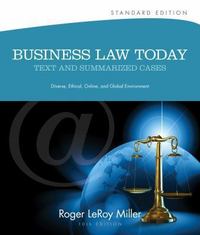A Question of EthicsStrict Product Liability. Susan Calles lived with her four daughters, Amanda, age 11, Victoria,
Question:
A Question of Ethics—Strict Product Liability. Susan Calles lived with her four daughters, Amanda, age 11, Victoria, age 5, and Jenna and Jillian, age 3. In March 1998, Calles bought an Aim N Flame utility lighter, which she stored on the top shelf of her kitchen cabinet. A trigger can ignite the Aim N Flame after an “ON/OFF” switch is slid to the “on” position.
On the night of March 31, Calles and Victoria left to get videos.
Jenna and Jillian were in bed, and Amanda was watching television.
Calles returned to find fire trucks and emergency vehicles around her home. Robert Finn, a fire investigator, determined that Jenna had started a fire using the lighter. Jillian suffered smoke inhalation, was hospitalized, and died on April 21. Calles filed a suit in an Illinois state court against Scripto-Tokai Corp., which distributed the Aim N Flame, and others. In her suit, which was grounded, in part, in strict liability claims, Calles alleged that the lighter was an “unreasonably dangerous product.” Scripto filed a motion for summary judgment.
[Calles v. Scripto-Tokai Corp., 224 Ill.2d 247, 864 N.E.2d 249, 309 Ill.Dec. 383 (2007)] (See pages 448–452.)
1. A product is “unreasonably dangerous” when it is dangerous beyond the expectation of the ordinary consumer.
Whose expectation—Calles’s or Jenna’s—applies here?
Why? Does the lighter pass this test? Explain.
2. A product is also “unreasonably dangerous” when a less dangerous alternative was economically feasible for its maker, which failed to produce it. Scripto contended that because its product was “simple” and the danger was
“obvious,” it should not be liable under this test. Do you agree? Why or why not?
3. Calles presented evidence as to the likelihood and seriousness of injury from lighters that do not have child-safety devices. Scripto argued that the Aim N Flame is a useful, inexpensive, alternative source of fire and is safer than a match. Calles admitted that she was aware of the dangers presented by lighters in the hands of children. Scripto admitted that it had been a defendant in at least twenty-five suits for injuries that occurred under similar circumstances. With these factors in mind, how should the court rule? Why?
Step by Step Answer:






